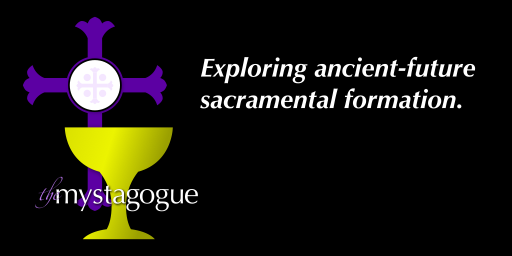The following is an outline for one of a series of four interactive sermons that can be used together with the four week mystagogical study, “28 days” posted under Formation.
Each sermon includes four segments:
- An experiential reflection–recalls individual and collective sacramental experience
- A symbolic/liturgical reflection–draws on themes and symbols from the liturgy of the community (the sacramental from your particular tradition can be substituted)
- A scriptural reflection–the experiential and liturgical reflections are given new context in light of the biblical text
- For the coming week–reference is made to the family and personal devotional studies for the coming week
Dr. Chris
__
Eucharist: the Advent of the Kingdom
Sermon Sentence
We encounter and recognize Christ, our Lord, in the breaking of the bread and become his body, full of his presence, a sacrament of his kingdom to the world.
Experiential Reflection
Share insights from the week before. What have you learned? Did God speak to you in any special ways?
Group reflection: eucharistic worship
- What do the different labels mean—eucharist, communion, Lord’s Supper, table?
- What do we do when we celebrate communion?
- How do the other parts of the liturgy relate to communion?
- What happens to us when we celebrate communion?
Symbolic/Liturgical Reflection
Group reflection: eucharistic symbols
Have the children take turns writing the symbols and symbolic actions as they are described. Make sure they have time to offer their own thoughts before the adults add to the list.
- What kinds of symbols are being used? What do they mean?Some possible symbols/symbolic actions to discuss: bread; wine; one cup, one loaf; lit candles; table; stole; offering; Scriptures read; sermon; holding cup; breaking bread; water poured into the wine; confession; sanctus; anaphora; epiclesis; Agnus Dei; mys- tery of faith; bowing; sign of the cross
- What kinds of movements/actions take place, what to they mean?
- What about the vestments of the priest, the vessels, the arrangement of the sanctuary— do they tell us anything? Do they communicate anything to God?
Scriptural Reflection
Text: Luke 42.13-35
Look for a pattern related to our worship. Consider the participants and their actions.
- What was going on?
- What roles did they play (host, server, served, teacher, learner, friend, stranger)? How did they change?
- What is significant about how Jesus was recognized?
- How did the two respond? What did they do?
Synthesis
Text: Col. 1. 15-20, 24-29
- What relationship does the church have to Christ according to Paul?
- What is the mystery Paul is describing? How is it made known to the church?
- What is the church to do with this mystery?
- What is Paul’s example to us?
For the Coming Week
Meditate on the Scriptures in your devotional guide and answer the questions provided. Most especially, consider what eucharist means for our daily lives. What does it mean to live eucharistically (with thanksgiving, in anticipation of the banquet of the kingdom)?
